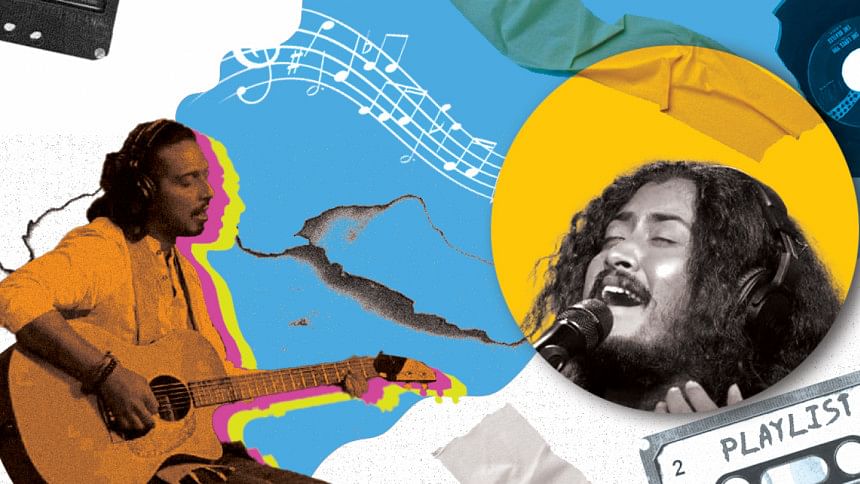Of grief, longing and 'Chiltey Roud'

I have often noticed that when people talk about music, it mostly comes down to its technicality. A critical analysis is conducted of certain pieces of music, their composition, use of instruments, literary breakdown of the lyrics, etc. For people like me, who are musically illiterate but heavily dependent on the art form in their personal lives, these discussions have a lot of knowledge and insight to offer but serve very little in expressing our reactions.
For many of us, music is mostly about the experience of listening to it, how certain songs make us feel, and the memories they bring up for us.
Chaina Bhabish, the first studio album by Shayan Chowdhury Arnob, was one such album that gave voice to my emotions. The album was a game-changer in the contemporary music scene, with its beautiful lyrics, composition, and minimalist musical arrangements. But the reason it still feels like home is the sheer warmth and love that it provides me with, and its recognition of the wide range of emotions my mind jumps through from time to time.
I was only a kid when the album was released and it took me many years to understand this by paying attention to the more underrated tracks of the album. One such piece was, "Chiltey Roudey," and a version of it is the latest release by Coke Studio Bangla—wherein Arnob's "slivers of sunshine" entwine with the Bhawaiya song "O Ki Ekbar Ashiya" by Abbasuddin Ahmed, sung by Ripon Kumar Sarkar (Boga).
Grief takes many faces after a while. It can be excruciating at times, and cathartic at others. The journey of losing a loved one turns from excruciating to cathartic as acceptance settles in. The wound is a permanent one that we want to distract ourselves from, but its presence is perpetual. Oftentimes, it's something that cannot be shared.
You cannot explain to anyone why, after many many months or years, it's suddenly hard for you to get out of bed and start a seemingly beautiful day with all its sunshine and daisies and colours.
That was what "Chiltey Roudey" has always done for me. A song that I can relate to: In a quintessentially urban setup, where your city gives you a little sunshine through the window and an almost sad understanding smile as if to stop your volcano of emotions from erupting. So you keep it all inside. You don't say it out loud, because the song does it for you.
For many, many years, this song accompanied me on my sudden days of grievance, when I longed for the presence of a lost parent. That's how deeply personal it became.
Almost 17 years later, the arrangement of the song's Coke Studio Bangla revival transcends the urbanities of "Chiltey Roudey" and gets closer to country nature, with its lyrics and tune.
But besides this technicality, for me, on a more personal note, "Chiltey Roudey" comes with the effort of restraining the emotions in a loss of words, while the newer song, "Chiltey Roud," is as open and expressive as it gets. Both come with their own expressions of longing and despair of separation, but the duality and dilemmas bring it even closer to the listener's heart.
With more years passing by, more names have been added to the list of lost loved ones. Some were lost to life, some to death, some to time. Now there are other pairs of eyes on my mind as well. When Boga sings of his yearning for the beloved's sight, declining any exchanges, my mind is not really taken to a country scene. Rather, when I close my eyes, the flute and the shehnai take me to the middle of a vast river where I feel stranded, like one from the dreams I dream. There's a promise that I can see a loved one when I reach the other end. I catch glimpses of them, hear their voices—but never quite manage to get to them.
In one reaction video to the new Coke Studio Bangla number, while showering the song with praises, the content maker says, "It's the little things." Though in a much different context, that's how I feel about "Chiltey Roud" as well. It's indeed the little things, memories and emotions that make music special to us, transcending the boundaries of our circumstances.
It's also these little things that make us realise the necessity of art for what it is. Art is something that we have always somewhat taken for granted collectively. But it is during moments like this when we feel how intertwined art is with our very existence. It is not just something that makes us feel. It's also something that gives voices and faces to those feelings. It humbles and grounds us, and we realise that we couldn't go by without its presence in our lives. Songs such as these make us realise that art is truly something to live for. That's where the real magic lies.
Nahaly Nafisa Khan is a sub-editor at the Metro desk of The Daily Star.

 For all latest news, follow The Daily Star's Google News channel.
For all latest news, follow The Daily Star's Google News channel. 





Comments